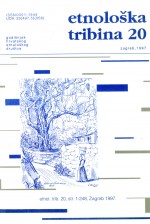Položaj žene u ruralnom Meksiku: srodstvo i odnosi spolova u Tehuitzingu
The position of Women in Rural Mexico: Kinship and Gender Relations in Tehuitzingo
Author(s): Dubravka MinđekSubject(s): Gender Studies, Cultural Anthropology / Ethnology, Rural and urban sociology, Migration Studies
Published by: Hrvatsko etnološko društvo
Keywords: position of women; rural Mexico; kinship and gender relations; Tehuitzingo; gender stereotypes;
Summary/Abstract: Through the analysis of everyday kinship and gender relations in the married migrants' households, the present work explores the position of women in a Mexican village with a large tradition of migration to the United States. At the same time it reconsiders some widespread gender stereotypes usually informed by ideological references. The essay begins with the description of the local gender ideology that gives a man the leading role in the economic well-being of the household while it associates the woman with domestic tasks and supports her subordination to the man's authority. The author points out that at discourse level both males and females share that ideology. Nevertheless, when she examines family routine and everyday gender interaction she finds that women are not (and never were) limited to housekeeping; they are present in agriculture, numerically dominant in commerce and perform numerous tasks of great importance for household economy. More important, although they usually avoid talking about it, women seem to be conscious of the importance and value of their work and in some crucial moments they demand its appreciation. Dealing with supposed male domination, the author notices that women are much more independent and powerful than proscribed by ideology, and that they are the ones who delegate authority, as well as responsability to the males. Rather than passively responding to gender ideology, from their position women use, negotiate and manipulate cultural norms in order to satisfy their own needs. In her conclusion the author suggests that women deliberately promote the mythology concerning man's authority in family issues, as well as his centrality in the economic well-being of the household, for reaching their life's goal: assure themselves security and protection through marriage at the same time apparently avoiding major responsability. An interesing characteristic of this investigation is the author's use of local court records of marital disputes in order to support her interpretations of the data gathered by means of standard anthropological field techniques.
Journal: Etnološka tribina : Godišnjak Hrvatskog etnološkog društva
- Issue Year: 27/1997
- Issue No: 20
- Page Range: 49-68
- Page Count: 20
- Language: Croatian

